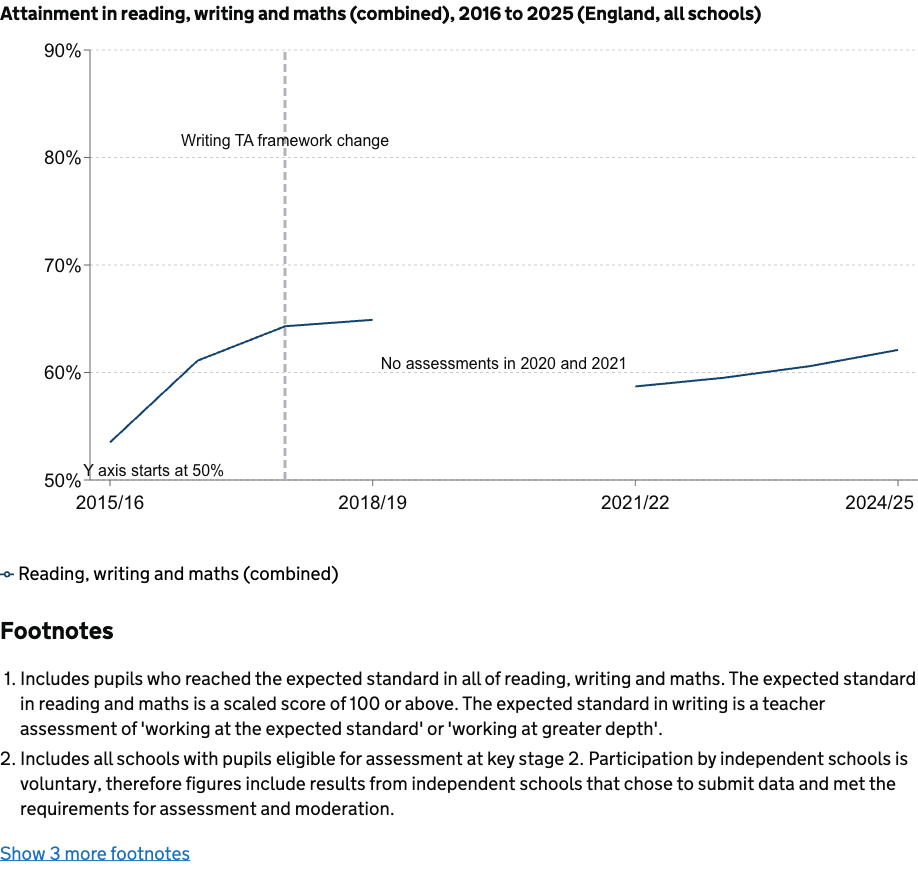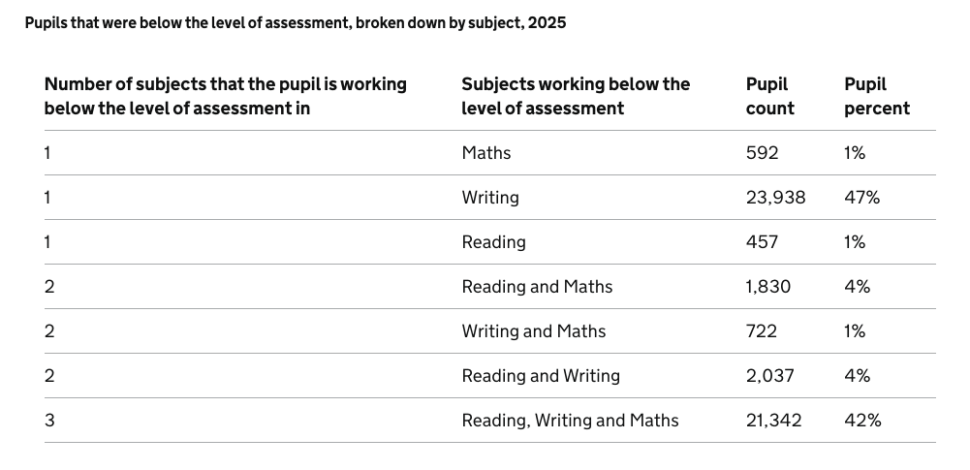National key stage 2 SATs results show another slight increase in the proportion of pupils meeting the “expected” standard.
The data, published this morning, shows 62 per cent met the benchmark in reading, writing and maths, up from 61 per cent in 2024.
Results have been creeping back up after dropping to 59 per cent in post-pandemic 2022. However, the headline figure has still not reached its 2019 level of 65 per cent.
The data for individual subjects shows that…
- In reading, 75 per cent of pupils met the expected standard, up from 74 per cent in 2024.
- In maths, 74 per cent of pupils met the expected standard, up from 73 per cent in 2024.
- In writing, 72 per cent of pupils met the expected standard, an increase of 0.5 percentage points from 72 per cent (rounded) in 2024.
- In grammar, punctuation and spelling, 73 per cent of pupils met the expected standard, up from 72 per cent in 2024.
- In science, 82 per cent of pupils met the expected standard, up from 81 per cent in 2024.

190,000 pupils below the expected standard
The results show that just under three in 10 pupils (29.4 per cent) at the end of key stage 2 were assessed as not meeting the expected standard in reading, writing and maths combined.
And 8.5 per cent of pupils were not assessed in all three of the subjects, “either because they were below the level of the assessment or for another reason”.
“This year 189,339 pupils were assessed as not meeting the expected standard, and since the pandemic over 800,000 pupils have not met the expected standard in reading, writing and maths following assessment,” the DfE said.
The department said 7.9 per cent of pupils were working below the level of assessment in at least one subject, and therefore did not take the test or teacher assessment.
This happens “where the school has deemed that the pupil is working below the overall standard of the assessments, such that a different assessment is required”.
But these pupils “could still be meeting the standard for some subjects”.
Analysis shows 47 per cent of the pupils in this group “were only below the level of assessment in writing”.

Call for more ‘personalised’ assessments
Education secretary Bridget Phillipson said despite “brilliant teachers” working “tirelessly” to support pupils, “we still have over a third of children leaving school below the expected standard in one or more of these critical subjects, with writing in particular continuing to lag below pre-pandemic levels”.
Government this week launched a campaign to boost the number of children reading, and is due to publish a writing framework for primary schools today to “build on wider work to drive up standards including significant investment in reading and writing”, Phillipson added.
But Tiffnie Harris, primary specialist at the Association of School and College Leaders, said SATs were “demanding, one-size-fits-all tests, and it would be better to move to a system of personalised assessments using the type of adaptive testing technology which is readily available”.
“This would allow questions to be tailored to the ability of the child and allow them to demonstrate what they know rather than feeling as though they are being judged on what they don’t know.”







Here’s a better idea why not just scrap them altogether. We survived before they existed. In fact, more children were probably able to enjoy their Primary Education; and were less depressed and anxious from the endless practice papers and unnecessary pressure placed upon them. Teachers were trusted to educate and may have even enjoyed their jobs.
Hi Dan,
Kids have always been tested.
Before SATS all children were tested. I was born in 1981, my sister in 1979.
The tests used to be called Richmond tests, prior to that it’s old gramma school 11+ etc.
With out these tests there is no way of grouping children for their classes for comprehensive.
Expecting an A* student to be working at the same level as somome who has ungraded is just unrealistic and unfair on both children. It’s finding that happy medium between a child stretching their ability and not excluding others.
All kids learn at different paces, a child who is less academic will struggle and disengage when the work is too hard, thus creating more of a learning gap and possibly even affecting their mental health.
My child has special needs, has managed the SATs in mainstream and is happy.
The pressure is what the family instill and the environment the child is in. You can’t blame that on the tests, that’s parenting and down to the individual family.
I agree with you solely, it has a lot to do with support. SATs doesn’t have to be scary nor depressing. Motivation and praise will give a child the greatest confidence that they will do their best. Also agree with grouping children in the classes they belong in order for those to get the right support they needed to also thrive.
My son has just got his SATS results and
I told him no pressure just do your best
We are delighted with his results
As a teacher of 31 years, that is simply not true. Many schools put a huge pressure on children and staff to perform in SATs. Teachers have to do intervention groups to try and support those who are not achieving expected standard, which is hard to implement when there is often no teaching assistant. I don’t believe that the average family puts much stress on their children regarding SATs.
Secondary schools do not need to and should not segregate children in potential success and failure groups as soon as they enter the portals. This is one reason why a 3 tier middle school system was much better; it makes SATs results redundant and useless in the places where middle schools still exist, yet they have to waste year 6 doing them anyway.
Do parents want their 9-year-olds walking to school on their own any more?
It doesn’t matter which definition of average you use. Some children will always be above it and others below it. Moving the goal posts and the way the results are reported hasn’t made any difference. Time to scrap SATs. It just wastes a whole year in year 6 cramming for these exams.
It’s generally been 27% not meeting the expected standard in maths.
They can meet the expected standard if they can only do year 3 and 4 maths. A large proportion of those who do not meet the expected standards are far below it.
Nick Gibb’s 2014 KS3 curriculum requires that all children carry on with their education at secondary school as though they understood year 5 and 6 maths. In areas of socio-economic disadvantage, the proportion of children who have not met the expected standard in maths is clearly 70+%. I’ve taught back-to-back large year 8/9 classes who cannot do year 3 maths. It is absolute hell for their mental health, attendance, complete mental disengagement, self-esteem and behaviour. It makes these sets completely unteachable.